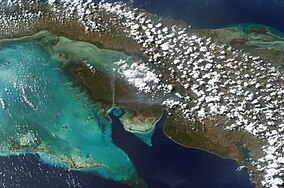Playa Larga
| Ciénaga de Zapata | |
|---|---|
|
IUCN category II (national park)
|
|

Zapata Swamp as seen from space.
|
|
| Location of Ciénaga de Zapata in Cuba | |
| Location |
|
| Nearest city |
Playa Larga Jagüey Grande |
| Coordinates | 22°24′N 81°34′W / 22.400°N 81.567°WCoordinates: 22°24′N 81°34′W / 22.400°N 81.567°W |
| Area | 4,354.3 km2 (1,681.2 sq mi) |
| Designated | 12 April 2001 |
|
Ciénaga de Zapata Zapata Swamp |
|
|---|---|
| Municipality | |
 Ciénaga de Zapata municipality (red) within Matanzas Province (yellow) and Cuba |
|
| Country |
|
| Province | Matanzas |
| Seat | Playa Larga |
| Area | |
| • Total | 4,162 km2 (1,607 sq mi) |
| Elevation | 5 m (16 ft) |
| Population (2004) | |
| • Total | 8,611 |
| • Density | 2/km2 (5/sq mi) |
| Time zone | EST (UTC-5) |
| Area code(s) | +53-52 |
Zapata Swamp (Spanish: Ciénaga de Zapata, Spanish pronunciation: [ˈsjenaɣa ðe saˈpata]) is located on the Zapata Peninsula in the southern Matanzas province of Cuba. It is located less than 150 kilometres (93 mi) southeast of Havana.Ciénaga de Zapata represents also a municipality, the largest one of Cuba with 4,162 km2.
Within the Zapata Swamp are over 900 autochthonous plant species, 175 species of birds, 31 species of reptiles and over 1000 species of invertebrates. Some of the most notable are local endemics to Cuba; for birds, it includes the Zapata wren, Zapata rail, and the Zapata sparrow. The Zapata Swamp is also visited by 65 species of birds during their migration pattern from North America through the Caribbean to South America. Zapata is also known for the local endemic Cuban crocodile (Crocodylus rhombifer) which are restricted to the Zapata Swamp and are being reintroduced to the nearby Lanier Swamp on the Isle of Youth (Spanish: Isla de la Juventud).
Red flamingos in Zapata
In crocodile farm in Zapata
Within the Zapata Swamp are numerous areas designated for environmental preservation, such as Zapata Swamp Natural Reserve and Las Salinas wildlife sanctuary, which is part of the larger Ciénaga de Zapata Biosphere Reserve (IUCN category VI) which in total is over 6,000 km² and the largest protected area, not only in Cuba, but also the Caribbean. The swamp is not only known for its size but also for being the best preserved wetlands in all of the Antilles, designated as a "Wetland of International Importance" by the Ramsar Convention on Wetlands in 1971. In mid-2001 an additional 4,520 km² were declared a Ramsar Site in mid-2001.
...
Wikipedia

